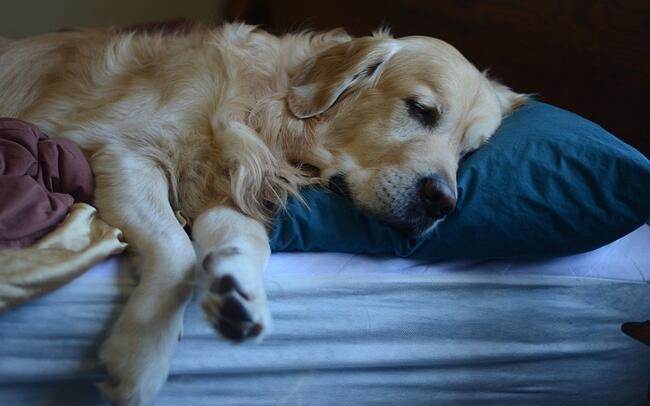
Hopefully, you will be assured that they are sleeping as normally as they can be.
People point out their dogs’ odd behavior when they are sleeping. They note things like how they seem to be running or their eyes will twitch back and forth really fast and wonder if their dog is dreaming.
It is also fun to speculate about what they might be chasing after when their paws twitch in their sleep!
SLEEPING THROUGH THE NIGHT
Much like human babies, puppies need a little bit of time before they are quiet throughout the night. The good news for dog owners is that their age is only 16 weeks. However, being quiet and calm doesn’t necessarily mean sleeping.
Dogs are individuals and therefore have differing personalities. Some dogs may sleep all eight hours on their bed and wake up with their owners in the morning. Other dogs will calmly move around, change position, and even eat or drink. There isn’t anything wrong with either of these things. Dogs are naturally restless sleepers.
SLEEP TRAINING
Sleep training is when you try to get your dog on your schedule. People who have a very routine schedule often do this without realizing it. Their dog will match when they sleep because it was absent-mindedly trained into them.
In fact, dogs tend to stick closer to their trained sleep schedules than people. After a while, they will start to wake up on their own, while their owners still need that pesky alarm clock!
HOW MUCH SLEEP DO THEY NEED BY AGE
On average, dogs sleep about 14 hours a day. However, this number is highly variable. The age of your dog, its size, and its overall health all play a part in how much a dog sleeps in a 24-hour period.
Puppies (up to 6-12 months) and elderly dogs will need closer to 18-20 hours of sleep a day.
For large breed dogs, ‘elderly’ is considered about 7 years of age and they generally sleep more anyway. For small breeds, they tend to start needing more sleep around 9 years old.
And, of course, underlying conditions or diseases can make your dog sleep longer, the same way that people sleep and rest when they feel sick.
DO DOGS DREAM
The short answer is probably. Just like people, dogs enter a stage of sleep known as Rapid Eye Movement (REM). In people, REM is when dreams take place. The brain activity during REM in dogs and humans is very similar.
Unfortunately, dogs can’t confirm this theory. While we can guess that, yes, they do dream, we don’t know that for sure. So, don’t be alarmed if your fluffy friend is growling or running in their sleep. They could just be dreaming!
However, just like scientists think dogs can have dreams, they also think dogs can get nightmares. Waking a dog up from a nightmare may be very frightening for them and they may not know what is going on.
The important thing to do in this situation is to stand back and let your dog calm down. Don’t risk touching them when they are already scared.
After they have calmed down, let them come to you so you can comfort them and, hopefully, get everyone back to sleep.
ARE DOGS HAPPY WHEN THEY SLEEP
Dogs are very happy when they sleep. Little puppies want to do nothing more than play, but a nap will do them a world of good.
Active breeds need the time to recharge and are usually very content and happy with the rest they get. Even dogs who don’t seem to do much at all benefit greatly from some good, deep sleep.
Some dogs can wake up from their nap startled and alert. They could be growling or have their ears pinned back on their heads.
If they wake themselves up, this is often a sign of anxiety, putting the dog on alert even when their heads are a little clouded from sleep. It could also be a number of other things, such as:
Nightmares
Irritation at being woken up
Fear response due to disorientation
Just stand back, and let your dog have some time to recuperate. You can go back to snuggling them in a second!
SUMMARY
Sleeping a normal amount is a sign of a healthy and happy pooch! When they are asleep, they are recharging, just like people. Whether it is a puppy that is going to be raring to go in an hour or an old dog who dozes the day away, this is a very important part of their routine.
You know your dog better than anyone, so knowing their sleeping patterns and making notes of changes or oddities is something that only you can do to ensure that your dog is in the best health possible.
So sit back, relax, and watch those squirrels evade your tired companion!
If you want to find a sleep-related topic, Alaska Sleep Clinic’s Sleep Education blogs are the place to start and end your search. Subscribe to our blogs today.









